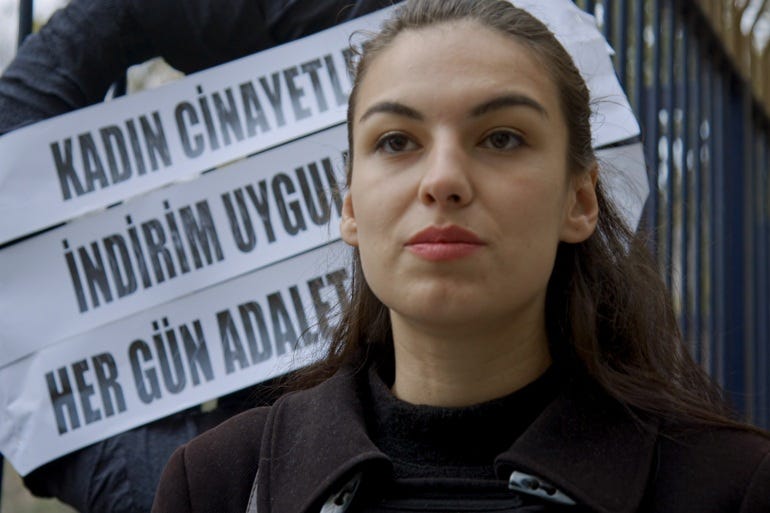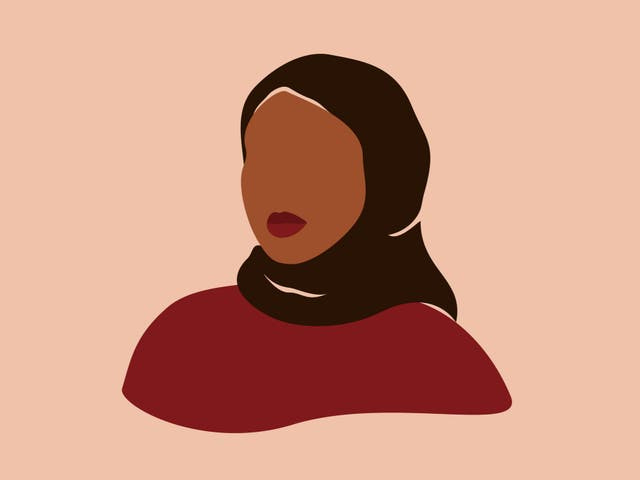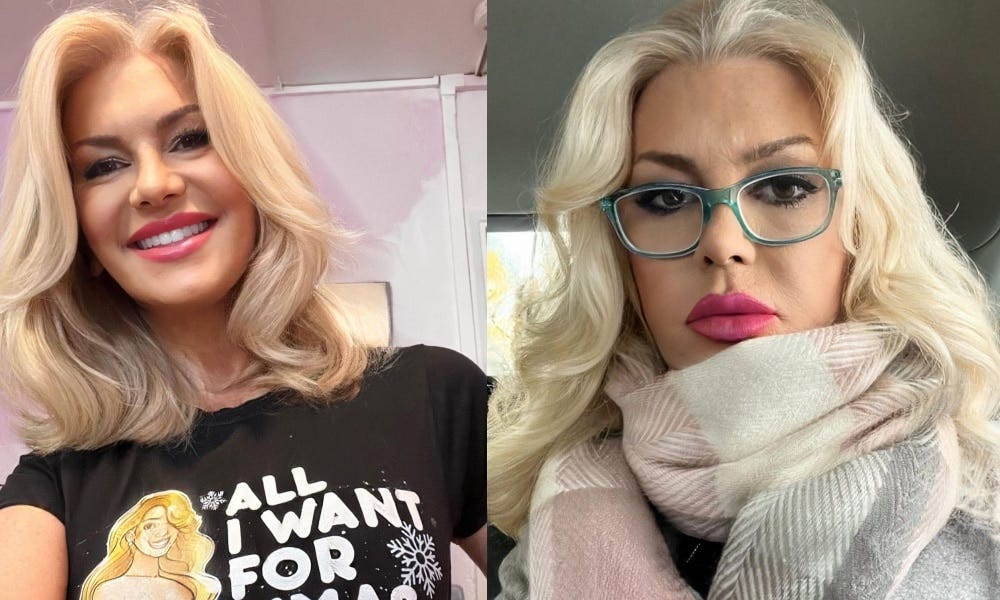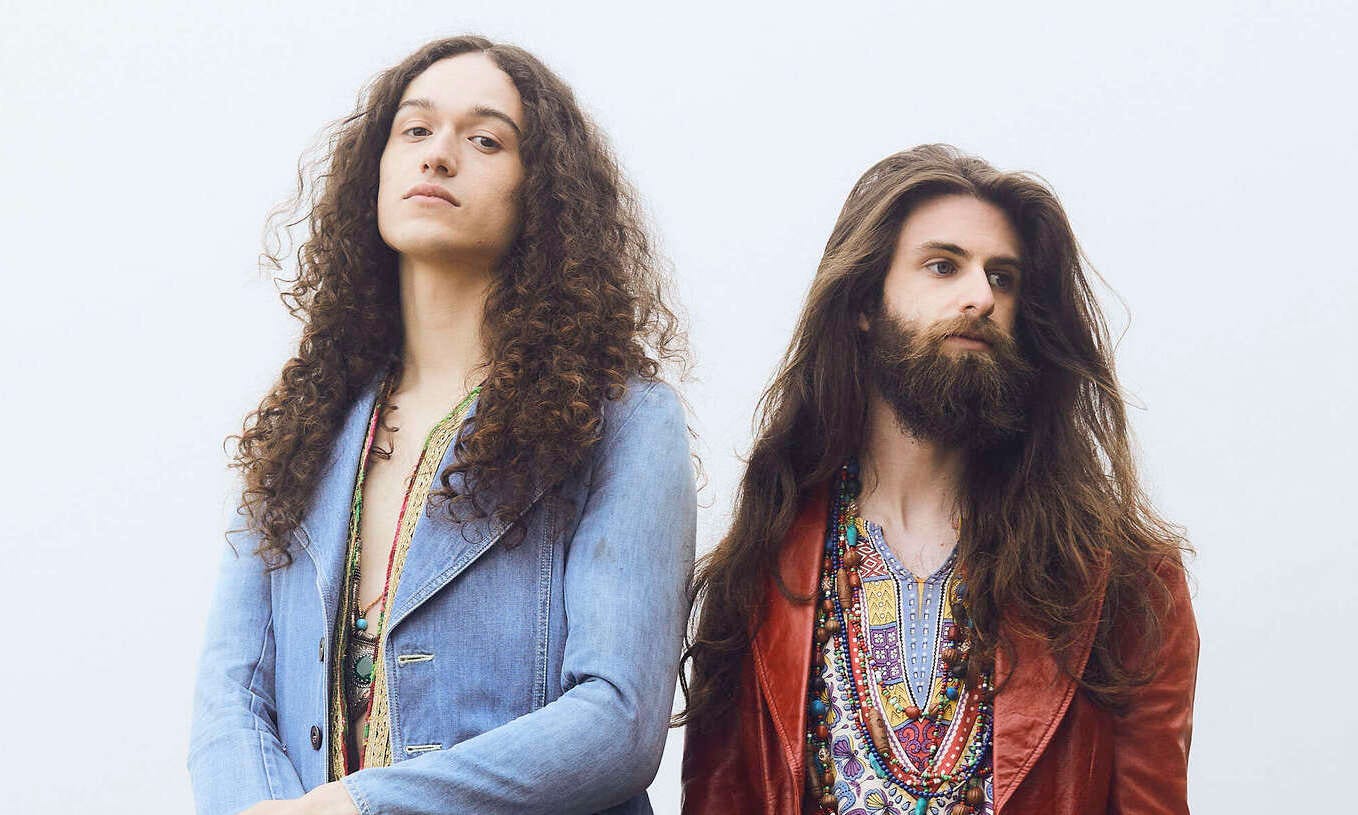Global Roundup: Oscar nod for Femicide Docu, Justice for El Salvador Obstetric Violence Victim, British Muslim Women on Islamophobia, World AIDS Day Intvu w/Rebecca Tallon, Indigenous Band Crown Lands
Compiled by Samiha Hossain
The film offers a close look beyond statistics, at the painstaking physical and emotional toll on two women [Screengrab from film 'Dying to Divorce']
CW: Violence against women
Dying Divorce a documentary chronicling the efforts of activists working to end violence against women in Turkey has been chosen as the United Kingdom’s official entry for the Best International Feature Film category at the Academy Awards. The documentary, which took five years to shoot, follows the work of lawyer Ipek Bozkurt and activist Aysen Ece Kavas who meet women survivors of gender-based violence to help them and their families seek justice through the Turkish criminal system.
Men in Turkey have killed 285 women this year alone, on course to exceed the 300 who were killed last year. Violence against women has been in the headlines in Turkey, but activists say the country’s legal system has failed at following through prosecutions and sentencing of the perpetrators due to a narrative that blames women who choose an independent life.
The documentary goes beyond the statistics and looks at the stories of two women. One is Kübra Eken, a television news anchor, who suffered a brain haemorrhage after her husband brutally hit her on the back of the head two days after giving birth to their first child. The other is Arzu Boztas, a mother of six, who was shot in the arms and legs by her husband after trying to divorce him because she learned he raped an underage neighbour and then tried to take her as a second wife.
Violence is where a woman wants to have a modern life, where a woman wants to make a personal choice, so violence is not about lower education and financial deprivation or anything, it’s actually about a woman’s decision and men trying to suppress and prevent that decision-making process. - Ipek Bozkurt
The film was kept from being screened this year at the Istanbul Film Festival, the country’s most prestigious film festival due to the political atmosphere in Turkey. The filmmakers await to hear if they will be shortlisted for an Oscar nomination. They also hope that more women within and outside of the country watch the documentary.
A protest as the court heard the case of Manuela, a Salvadorean woman who died while jailed for aggravated homicide after miscarrying. Photograph: Marvin Recinos/AFP/Getty
Women’s rights activist in El Salvador celebrated the Inter-American court of human rights ruling that the country was responsible for the death of Manuela, a woman who was jailed in 2008 for killing her baby when she suffered a miscarriage. The court has also ordered El Salvador to reform its draconian policies on reproductive health. This decision marks the first time an an international court has ruled on El Salvador’s extreme abortion laws.
Since 1998, abortion in El Salvador has been banned without exception, even in cases of rape and incest. Since then, over 180 women have been jailed for murder for having an abortion after suffering obstetric emergencies.
When Manuela went to the hospital after miscarrying, staff failed to provide her with timely treatment and instead subjected her to verbal abuse and accused her of having an abortion. She was handcuffed to her bed and denied access to a lawyer while police interrogated her. She died from cancer after receiving inadequate medical diagnosis and treatment while serving a 30-year prison sentence for aggravated homicide after a miscarriage.
The court ruled that the state must pay reparations to Manuela’s family, and should develop comprehensive sexual education policies and guarantee doctor-patient confidentiality.
The Inter-American court has done justice by recognising Manuela was another victim of an unjust legal context that originates in the absolute prohibition of abortion. Manuela’s story is a sad one, but it represents a change and becomes a path of justice and hope for all women in Latin America and the Caribbean who are criminalised for obstetric events. - Morena Herrera, at the Feminist Collective for Local Development
Activists are celebrating the ruling, as they believe it could advance reproductive rights across Latin America. However, they also note that the issue of poverty affecting access to reproductive rights remained a challenge.
There are over 180 cases of women in jail, or that have been jailed, over these issues. What that means is we’re dealing with a state that criminalises women and, above all, criminalises poor women in the most rural and impoverished areas. - Catalina Martínez Coral, regional director for Latin America and the Caribbean at the Center for Reproductive Rights
A silhouette of a Muslim woman wearing a hijab. Getty Images/iStockphoto
This November marked Islamophobia Awareness Month (IAM), an annual campaign co-founded by MEND, a charity that seeks to tackle Islamophobia in the UK, which aims to highlight the discrimination Muslims face across different sectors of society. This year, groups have been calling on the government to adopt an official definition of Islamophobia as proposed by the All-Party Parliamentary Group on British Muslims (APPG). Many believe that a definition will help establish a mechanism for accountability.
MEND’s work shows that Muslim women who wear the headscarf are particularly vulnerable to Islamophobia. Muslim women who wear the headscarf or a niquab say that they experience microagression every day, at work, at university or even online.
Rana Yusuf, a doctor, provides some examples such as overhearing colleagues describe Muslims as “a little bit backwards and weird” while discussing the news of Malala Yousafzai’s marriage, and being told by a nurse that she could not wish a Muslim colleague “Ramadan Mubarak” – a greeting Muslims use to wish each other a happy Ramadan – because she was not “speaking English”. She did not receive hateful comments about her hijab at work, but she often felt nurses treated her less favourably than they did non-Muslim doctors. Her suspicions were later confirmed when she stopped wearing a hijab and felt a shift in the way she was treated.
The principal reason behind my decision is that I wanted to be invisible. I wanted to come in and do my job and go home, and not have people reacting to me. I noticed a massive difference when I stopped wearing the hijab. I was very much the same person, with the same knowledge but I was just getting much better responses from nurses and colleagues...This is what silencing looks like, when someone is driven away and made to feel like they can’t participate in a space – there is no safe space for me to be myself as a Muslim woman. - Rana Yusuf
Another Muslim woman, Khadija Khan, a former student at the University of Glasgow says it was difficult for her to participate in conversations around the Middle East, Palestine and religious extremism that were integral to her studies. She initially challenged some of the comments but stopped when a tutor told her “a successful student should be able to detach themselves from personal and emotional feelings they have towards a subject”. She felt her university experience became less rewarding as she tried to blend into the background by not taking part in seminar discussions.
Some of the things said in class by other students who were white and non-Muslim should 100 per cent have been challenged as Islamophobic, but it was really exhausting to have that onus on me because my tutor or lecturer was letting them be said. - Khadija Khan
Ayesha Yaqub, an employee at the Muslim Association of Britain, often faces racism on Twitter which gets worse if her profile picture shows her hijab. She says she can receive abuse for sharing her views on social issues such as universal credit or the monarchy.
The minute they see a headscarf on your profile, that’s it, you’re a target. They don’t care where you’re from, for them being a Muslim is worse – it’s the worst identity you could have...It’s crazy to me that my experience as a Muslim woman using social media is completely different to someone who doesn’t have those identity markers that make them a target for racial abuse and hate. - Ayesha Yaqub
These women’s stories and undoubtedly countless other similar ones point to a system that enables the silencing of Muslim women. It is powerful that more Muslim women are speaking out and insisting that more action must be taken to counter Islamophobia.
Rebecca Tallon de Havilland wearing a U=U t-shirt. Via Pink News
Pink News spoke to trans activist Rebecca Tallon, who is living with HIV, to mark World AIDS Day. In 1987, in her late 20s, Rebecca went to the hospital to have gender affirmation surgery. However, a routine test revealed she had HIV.
When I was told I had it, and that I had two years to live – oh my God, my whole world just fell apart. It just stopped. And to this day, I’ve still never gotten that back. I was in my 20s – I’m now 63. My world changed, and it ended in many ways. - Rebecca Tallon
Today, at 63, she lives in London and dedicates her time to raising awareness of the fact that HIV doesn’t only affect gay and bisexual men – it also affects women.
Rebecca was “cut off from everything” after being diagnosed with HIV, including from her loved ones. She was supposed to move to New York to work as a hair and make-up artist, but a policy prohibiting HIV-positive people from moving to the United States meant she was denied the opportunity. That rule was only changed in 2010. For a long time, banks didn’t lend to people with HIV because they assumed they wouldn’t live long enough to pay it off. The discrimination caused Rebecca to be silent, but in recent years she wants to share her experience.
For 29 years I was silent. I was getting to the stage where I was in my 50s and I thought: ‘Is this it for me? Is this my lot?’ There was a lot of people who wouldn’t even have remembered how well known in Ireland I was for the work I did. I felt talentless. I felt I was too old to do anything. - Rebecca Tallon
Rebecca found out about a programme run by the Terrence Higgins Trust called Positive Voices, where people with HIV go into schools to talk to students about their status. She says speaking to teenagers was a life-changing experience for her. Now, she works to raise awareness about the facts of HIV and how it doesn’t only affect gay and bisexual men. She says many of the women contracting HIV are in middle age, might be menopausal, going through a divorce and dating again for the first time.
I just felt for the first time in my life that I had been as honest and as transparent as glass. When I left there, I was walking on air – to me, it was the best drug I’d ever taken. And then it grew from there and before I knew it I was talking on big platforms in places like Amsterdam. People would say to me, ‘How did you do it?’ And I’d say, I just told the truth for the first time in my life. I didn’t need a script, I just said it as it was. - Rebecca Tallon
Cody Bowles and Kevin Comeau. Credit: Travis Shinn via Xtra
Xtra spoke to Indigenous artists Cody Bowles and Kevin Comeau of the band Crown Lands just after they finished recording their new live album Odyssey Vol. 1, and just before the band headed out on an eastern Canadian tour. Growing up the two were careful to mask their identities but now they want to use their musical identities to show the plight of Indigenous people.
Being a band called ‘Crown Lands,’ we have to talk about what’s actually going on and the fact that Crown land is stolen land. We have to talk about colonization, the ramifications that are still being felt every single day, and the fact that it’s not ancient history. - Kevin Comeau
The band’s songs cover topics such as the arrival of European colonizers and the beginning of Indigenous resistance and murdered and missing Indigenous women, girls, and Two-Spirit people.
Comeau and Bowles also do not confine themselves to the gender binary. Comeau who describes both of them as “feminine, bristles at traditional notions of masculinity.”
Gender is ancient and fluid and unrestricted. It’s only these things that we put upon ourselves and these limitations that we force upon ourselves that really confine our spirit. The more we let go and detach from this thought of what should be and the perception you were born like this, therefore you must be like this… if we can detach ourselves from thoughts like that, I feel like the world will be better, and people’s mental health will be way better than it is currently. - Cody Bowles
Crown Lands is creating art that is beautiful, bold and unafraid to cover meaningful issues. Their latest album was released yesterday digitally and as a deluxe vinyl package.
Samiha Hossain (she/her) is a student at the University of Ottawa. She has experience working with survivors of sexual violence in her community, as well as conducting research on gender-based violence. A lot of her time is spent learning about and critically engaging with intersectional feminism, transformative justice and disability justice.
Samiha firmly believes in the power of connecting with people and listening to their stories to create solidarity and heal as a community. She refuses to let anyone thwart her imagination when it comes to envisioning a radically different future full of care webs, nurturance and collective liberation.






